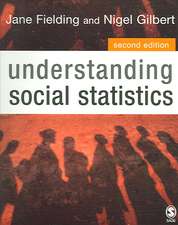The Philosophy of The Social Sciences
Autor Alan Ryanen Limba Engleză Paperback – 31 dec 1969
The book begins by explaining the point of asking specifically philosophical questions - an issue on which many social scientists have come to grief. Summarising the concern of the philosopher of social science as the desire to explain rationally the scientific standing of social enquiry, it leads into an account of the nature of scientific explanation, paying special attention to the role of theories in science. The applicability of the dominant account of scientific explanation to human behaviour is shown to raise conceptual problems of an intractable kind - some of them traditional problems concerning 'free will', others contemporary problems with a bearing on social policies about crime, mental health and the enlargement of personal liberty. The intractability of these problems sets the book off on exploring the claim that social understanding is essentially non-scientific, because it involves the analysis of social meanings rather than casual regularities. This claim is seen to contain a good deal of sense - much of it well enshrined in sociological and anthropological practice - but to be misleadingly expressed. Next, the discussion turns to the argument that the proper explanation of social phenomena is 'functionalist' in character; functionalism is seen to do justice to the often-defended view that social phenomena are frequently holistically explained, but is rejected as involving anything peculiar to the explanation of social phenomena - and several self-ascribed functionalists are shown to be offering non-functionalist explanations. In the concluding chapters the role of the social sciences as ideologies is discussed, first in the context of social theorists' ambitions for a science which offers long-range predictions of social phenomena, and finally in the context of doubts about the possibility of objectivity in the description and analysis of social facts. Throughout the book every effort is made to represent conflicting views as fairly as possible; the differences within social science are emphasised in the attempt to show how no single simple account can do justice to the diversity of explanations offered by social scientists.
Preț: 314.13 lei
Nou
Puncte Express: 471
Preț estimativ în valută:
60.11€ • 62.76$ • 49.75£
60.11€ • 62.76$ • 49.75£
Carte tipărită la comandă
Livrare economică 05-19 aprilie
Preluare comenzi: 021 569.72.76
Specificații
ISBN-13: 9780333109724
ISBN-10: 0333109724
Pagini: 256
Dimensiuni: 140 x 216 x 19 mm
Greutate: 0.47 kg
Ediția:1970
Editura: Macmillan Education UK
Colecția Red Globe Press
Locul publicării:London, United Kingdom
ISBN-10: 0333109724
Pagini: 256
Dimensiuni: 140 x 216 x 19 mm
Greutate: 0.47 kg
Ediția:1970
Editura: Macmillan Education UK
Colecția Red Globe Press
Locul publicării:London, United Kingdom
Cuprins
Preface.-
PART
1:
THE
QUESTIONS
THAT
PHILOSOPHERS
ASK.-
PART
2:
SOME
BASIC
TOOLS
OF
PHILOSOPHY.-
PART
3:
THE
DEDUCTIVE
CONCEPTION
OF
EXPLANATION.-
PART
4:
THE
ROLE
OF
SCIENTIFIC
THEORIES.-
PART
5:
THE
CAUSAL
EXPLANATION
OF
BEHAVIOUR.-
PART
6:
IS
THE
SCIENCE
OF
SOCIAL
LIFE
A
SCIENCE?.-
PART
7:
THE
SOCIAL
SCIENCES
AS
SCIENCES.-
PART
8:
WHOLES,
PARTS,
PURPOSES
AND
FUNCTIONS.-
PART
9:
PREDICTION
AS
A
GOAL
OF
SOCIAL
SCIENCE.-
PART
10:
SCIENCE,
SOCIAL
SCIENCE
AND
IDEOLOGY.-
Bibliography.-
Index.
Notă biografică
ALAN
RYAN
teaches
politics
and
philosophy
at
New
College,
Oxford.
In
the
past
he
has
taught
at
the
Universities
of
Keele
and
Essex,
as
well
as
at
the
City
University
of
New
York.
He
has
written,
reviewed
and
broadcast
on
a
variety
of
topics
and
believes
that
philosophy
should
be
made
accessible
to
a
wider
audience
than
professionals.
He
is
the
author
ofThe
Philosophy
of
John
Stuart
Mill.

















